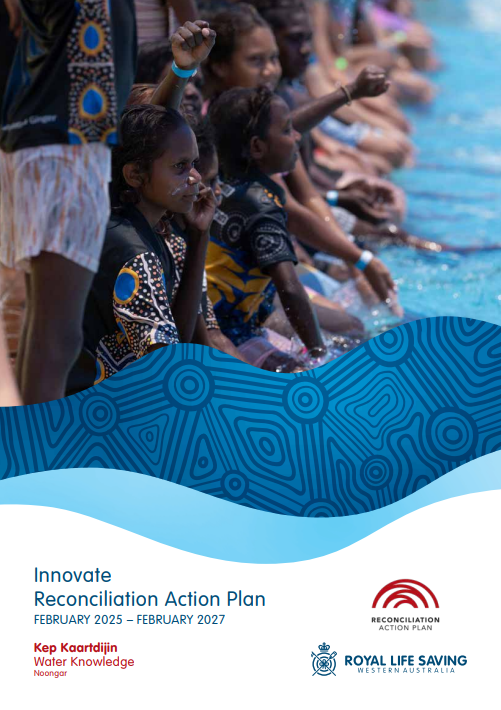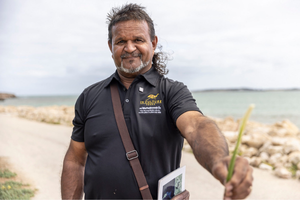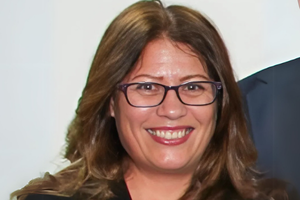Royal Life Saving WA acknowledges the Aboriginal and Torres Strait Islander people of this nation. We pay our respects to their Elders past and present, recognising their continued connection to land, waters and communities.
Our commitment to reconciliation is an evolving journey, guided by respect, collaboration, and meaningful action.
Our Reconciliation Journey: Reflecting, Learning, and Innovating
 Our reconciliation journey is built on listening, learning, and taking meaningful action. Through our Reflect Reconciliation Action Plan (RAP), we established a strong foundation, fostering awareness and relationships with First Nations communities. As we move into our Innovate RAP, we are committed to embedding reconciliation into our everyday practices, creating opportunities, and driving long-term change. This journey is ongoing, and we are dedicated to walking alongside First Nations peoples to build a more inclusive and culturally responsive future.
Our reconciliation journey is built on listening, learning, and taking meaningful action. Through our Reflect Reconciliation Action Plan (RAP), we established a strong foundation, fostering awareness and relationships with First Nations communities. As we move into our Innovate RAP, we are committed to embedding reconciliation into our everyday practices, creating opportunities, and driving long-term change. This journey is ongoing, and we are dedicated to walking alongside First Nations peoples to build a more inclusive and culturally responsive future.
The rivers, lakes, pools, billabongs, and dams in Australia bring life to communities. They are spaces for play, social connection, and recreation.
We recognise that water safety awareness and enjoyment of our waters is a collective responsibility. We can all play a part.
We celebrate the resilience, survival, wisdom, deep connection to water and land that continues in Aboriginal and Torres Strait Islander cultures and communities. We are committed to a future path that actively engages and encourages Aboriginal and Torres Strait Islander peoples to access, design, participate in, and lead water safety programs. This is a long-term commitment which encompasses our research, policy, communications, programs and leadership teams. We will continue investing time and resources to this commitment.
Through active listening and strong, respectful relationships with Aboriginal and Torres Strait Islander Elders, professionals, and advocates, we will work to create opportunities for Aboriginal and Torres Strait Islander peoples of all ages to participate in aquatics, lifesaving and water safety activities. These opportunities include employment, program design and evaluation, swimming education, and lifesaving training.
Royal Life Saving seeks to be a culturally safe workplace for Aboriginal and Torres Strait Islander peoples.
Just as swimming can be made up of different strokes, our reconciliation journey will be made up of different actions. We recognise there will be times we need to listen and learn, lead and follow.
Reconcilation Action Plan - Download
Wardan Bilya Kepa Bidi djiba-djobaliny djildjit baraniny mordak Kepa
Ocean, river water pathways, swimming, fishing, deep water

“Water is part of the song-lines of our people who lived off the Derbarl yerrigan as a water and food source and apart of daily life. My people followed the 6 seasons and in Kambarang season moved down to the coast preparing for the warmer months and dieted on fish and other water species. Parents of children were very careful and supervised children when swimming and had an understanding of tides and weather patterns.
The education around water safety is very important especially in remote locations and in the home where accidents like babies falling into buckets occur.
The Waugle is part of our dreamtime and when we are at the Bilya and the ocean we throw sand in the water to pay respect to the Waugle and our ancestors who in our dreaming, our spirit goes out to the ocean where the sun sets to be with our ancestors.”
Gantharri guyi yamba wangganyina nagarn wirriya, baba, muga, thalganjangu, barraja
Grandparents through to grandchildren speak and observe the saltwater, freshwater, lagoons and country

“The Malgana people of Gathaagudu (Two Waters) Shark Bay deeply revere the waters that shape our lives and communities. As the rivers, lakes, and billabongs are celebrated across Australia, our coastal waters are not just sources of sustenance but spaces of cultural significance, where stories are shared, connections are forged, and traditions are passed down through generations.”

